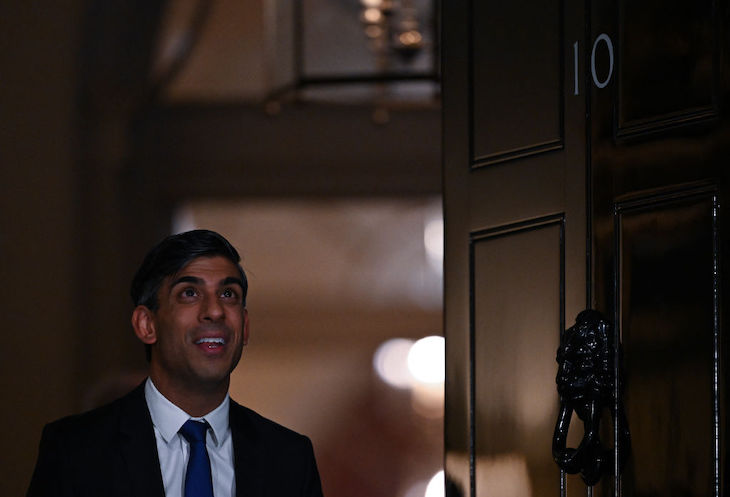Do not let the relatively comfortable margin of victory for the Rwanda Bill’s second reading fool you: we have now moved squarely into the ‘third Brexit’ stage of British politics.
The first British exit from looming European control over key policy levers came when eurosceptics beat off a plot to take the country into the single currency. The second Brexit, obviously, was actual Brexit, when we voted to ‘take back control’ of our laws and especially our borders by leaving the EU and ending free movement obligations.
During each of these two mighty and protracted struggles, both of which almost tore the Tory party apart, those resisting the movement of sovereignty away from the nation state and into supra-national European institutions were depicted as jingoistic headbangers. But on each occasion the headbangers won in the court of public opinion.
Once again, the Conservative party is attempting to straddle an unbridgeable divide
Round three concerns a now fully-fledged campaign to take back control over the growing menace of irregular migration, not just from the European Court of Human Rights, based in Strasbourg, but from the United Nations too, which has also sought to impose obligations on destination countries that are unsustainable in the modern world.
And, once again, the Conservative party is attempting to straddle an unbridgeable divide. Whereas Labour and the Lib Dems are united behind undertakings made under ‘international law’ and Nigel Farage’s Reform Party is united behind restoring national sovereignty, the Tories seek to have a foot in both camps. Hence it was that Home Secretary James Cleverly declared that the Safety of Rwanda Bill was ‘pushing the edge of the envelope’ of international law in respect of limiting the rights of illegal immigrants to challenge removal to the central African country. He was asking MPs to believe that the government had found a way to reassert national control while not breaching onerous international obligations.
During the Brexit years, it was often declared by the smart people in the Tory party that Brexiteers were seeking ‘unicorns’ – fantastical non-existent creatures – by wanting, for example, to be outside the single market and the customs union and yet to still have liberal trading arrangements with European markets.
This time round it is the Tory smart tendency, embodied in the slender frame of Rishi Sunak, that is chasing unicorns. It is doing so by thinking it can impose standard removal of irregular migrants to third countries while remaining a signatory of the European Convention on Human Rights and under the jurisdiction of its aggressively expansionist supervisory court.
Sunak declared as long ago as January that he would do ‘whatever it takes’ to stop the boats. How he must wish he had set out an ambition simply to reduce them, as he did with the rate of inflation or the size of the national debt. Then he could be claiming his wind-assisted 2023 result (a 33 per cent reduction) as a qualified victory. But as Suella Braverman reminded us all in her Commons personal statement, reducing the numbers is not the same as ‘stopping the boats’. In that statement, Braverman also openly declared her ambition to get Britain out of the European Convention.
Yesterday the former immigration minister Robert Jenrick also lined up in the national sovereignty corner, declaring that he would always put the interests of the British people above the nebulous concept of international law. Jenrick eloquently explained why the Rwanda Bill will not work. The rights of individual appeal it preserves, even narrowly drawn, will be used by claimants to delay their deportations. At some point one will hit on a winning sob story and that will become the standard template for others to use. The European Court will then lay down some more of its controversial ‘Rule 39’ judgments forbidding deportations and we will be back where we began: on the tarmac at RAF Boscombe Down watching planes going nowhere. And the idea of the UK government ignoring such rulings while the current Foreign Secretary, Justice Secretary and Attorney General (among others) sit around the cabinet table is for the birds.
The Safety of Rwanda Bill is this parliament’s equivalent of Theresa May’s Chequers deal. The Bob Neill and Robert Buckland tendency of internationalist centrist Tories will not tolerate it being toughened any further. The pro-nation staters such as Danny Kruger and Miriam Cates will not put up with it as it is. When the legislation comes back for its third reading in January, these two contradictory political philosophies will once again be in full conflict.
Should it somehow crawl onto the statute book it will not usher in a durable deterrent against small boat crossings and will therefore merely ratchet up public cynicism towards the Tory party still further. Keir Starmer has already pledged to scrap the Rwanda policy altogether if he becomes prime minister. There cannot be much doubt about that now. In the old days it was said that to govern is to choose, but under Sunak, as under May before him, to govern is to lose.
This article is free to read
To unlock more articles, subscribe to get 3 months of unlimited access for just $5








Comments
Join the debate for just $5 for 3 months
Be part of the conversation with other Spectator readers by getting your first three months for $5.
UNLOCK ACCESS Just $5 for 3 monthsAlready a subscriber? Log in